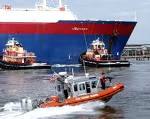
EPA, Coast Guard MOU Steps Up Efforts to Protect U.S. Waters
A memorandum of understanding outlines enhanced coordination of enforcement and compliance activities.
The U.S. Environmental Protection Agency and U.S. Coast Guard on Feb. 11 signed a memorandum of understanding (MOU) to work together to protect people’s health and the environment. The MOU outlines steps the agencies will take to better coordinate efforts to prevent and enforce against illegal discharges of pollutants from vessels, such as cruise ships and oil tankers.
The Coast Guard has agreed to incorporate components of EPA’s vessel general permit program into its existing inspection protocols and procedures to help the federal government address vessel pollution in U.S. waters. The MOU creates a framework for improving agency cooperation on data tracking, training, monitoring, enforcement, and industry outreach. The agencies also agreed to improve existing data requirements so that information on potential violations observed during inspections can be sent to EPA for evaluation and follow-up.
The vessel permit program applies to more than 61,000 commercial ships based in the U.S. and more than 8,000 foreign ships operating in U.S. waters. The vessel permit covers 26 types of discharges such as deck run-off from rain, ballast water used to stabilize ships, and wastewater from showers, sinks and laundry machines. These discharges may result in negative impacts on the environment, including the spread of invasive species from ballast water that can harm sensitive ecosystems. The vessel permit program also specifies corrective actions, self inspections and self monitoring, record keeping and reporting requirements.